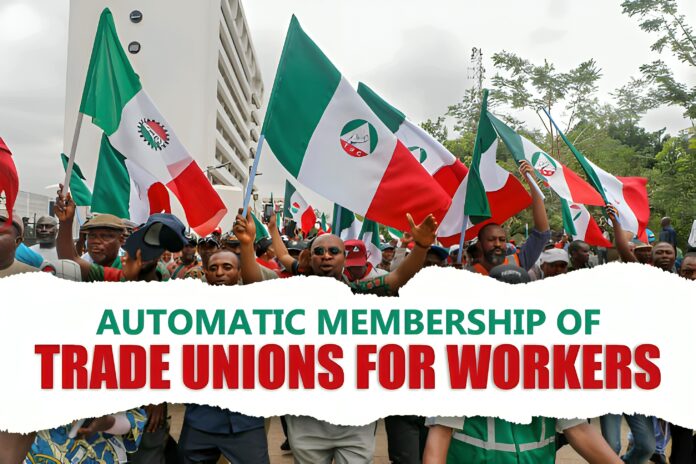(Being the paper presented by Femi Falana SAN at the National Webinar on Abuse of Market Dominance and Unfair Labour Practices held by FCCPC, in collaboration with Faculty of Law, University of Lagos, Akoka, Lagos on Monday 15th Sept., 2025) .
INTRODUCTION
A few days ago, the National Union of Petroleum and Gas Workers (NUPENG) directed its members to embark on industrial action to protest the plan of the Dangote Petroleum Refinery to force newly recruited drivers to sign an undertaking not to belong to any existing union in the oil and gas industry in the country. As soon as the strike commenced the State Security Service intervened to negotiate a truce between both parties.
In a joint statement signed by the officials of both parties and the government, it was resolved that “since workers’ unionisation is a right in line with the provisions of the extant laws, the management of Dangote Refinery and Petrochemicals agreed to the unionisation of employees of Dangote Refinery and unionisation of employees of Petrochemicals, who are willing to unionise. Accordingly, “the process of unionisation shall commence immediately and be completed within two weeks (9-22 September, 2025), and it was agreed that the employer cannot set up any other union.”
Even though the strike was called off thereafter, the terms of the truce brokered by the Federal Government and public discourse on the right of workers to belong to trade unions have not reflected the current state of the law. Hence, it is pertinent to review the origin of trade unions, right of workers to unionise and the duty of employers to recognize trade unions that have been registered by the Registrar of Trade Unions.
ORIGIN OF TRADE UNIONS
A trade union was regarded as a criminal conspiracy under the Combination Act enacted in 1799 by the British Parliament. The Act prohibited trade unions and collective bargaining by British workers. Under the law any combination of two or more masters, or two or more workmen, to lower or raise wages, or to increase or diminish the number of hours of work, or quantity of work to be done, was punishable at common law as a misdemeanour.
As the trade unions were driven underground as a result of the proscription, the Parliament was compelled to repeal the
Combination Act in 1824. However, in response to the series of strikes that followed, the Combinations of Workmen Act was passed in 1825. It allowed trade unions to operate but severely restricted their activities. The same approach was adopted in the occupied territories by the British colonial regime.
With respect to the origin of trade unions in Nigeria, Baba Aye has rightly observed that even though “there had been manifestations of trade unionism from the nineteenth century and a trade union organisation since 1912, it was not until April 1, 1939 that trade unions became legal entities… Thus legalization of trade unions was itself a policy aimed at incorporating them into the colonial scheme of things. Similarly the policy of ‘guided democracy and limited intervention’ of the military in 1975, which led to the establishment of the current NLC on February 28, 1978, was with the same intent.”
MEMBERSHIP OF TRADE UNIONS
Under the Trade Union Act, 1973, a trade union is defined as “a temporary or permanent combination of workers or employers whose purpose is to regulate the terms and conditions of employment, regardless of whether the combination is already considered unlawful under restraint of trade laws or whether it provides benefits to its members.”
The fundamental right of workers to unionize is also recognised by section 40 of the Constitution which provides that “Every person shall be entitled to assemble freely and associate with other persons, and in particular he may form or belong to any political party, trade union or any other association for the protection of his interests…” See Registered Trustees of Association Of Tippers and Quarry Owners of Nigeria v Yusuf & Ors (2011) LPELR-5024(CA).
Furthermore, article 10 of the African Charter on Human and People’s Rights Ratification and Enforcement Act guarantees freedom of association while the International Labour Organisation Convention 87 protects the unfettered right of “workers and employers, without distinction whatsoever, shall have the right to establish and, subject only to rules of the organisation concerned, to join organisations of their own choosing without prior authorisation.”
By virtue of section 11 of the Trade Union Act, employees of certain government and public bodies, including the Customs and Excise Department, the Immigration Department, the Prison Services, the Central Bank of Nigeria, and the Nigerian External Telecommunications (NET), are prohibited from forming or joining trade unions. However, nothing in this section shall be con strued as preventing the selling up of joint consultative committees in the establishments concerned.
No doubt, the 2005 Trade Unions (Amendment) Act sought to promote voluntarism but it did not repeal, amend or substitute any of the provisions of the Third Schedule Parts A, B and C of the Trade Unions Act Cap. T14 LFN 2004. In PERESSA v. SSACGOC [2009] 14 NLLR (Pt. 39) 306, the NIC held that: “Voluntarism and the freedom to choose which union to belong to is limited to the unions empowered to operate within a clearly defined jurisdictional scope. Voluntarism must exist within and not outside all existing relevant laws and regulations.”
AUTOMATIC MEMBERSHIP OF TRADE UNIONS FOR WORKERS
Any person who is 16 years and above may be a member of a trade union while a person must be 21 years and above before becoming an official of a trade union. Since the Child’s Rights Act has prescribed 18 years as the age of maturity, a person under 16 can no longer be permitted to join a trade union.
It is trite that workers and senior staff have equal right to join trade unions. However, while workers are deemed to be members of trade unions with unquestionable right to opt out, senior employees are required to opt in by indicate their wish to join trade unions. Therefore, the aforementioned agreement which allowed workers Dangote Refinery Petrochemicals who are “willing to unionise” to do so within two weeks was totally wrong.
With respect, the agreement of the Dangote Refinery and Petrochemicals to allow unionisation of their employees “who are willing to unionise” is tantamount to illegal interference in the internal affairs of Nupeng. On its own part, Nupeng was wrong to have agreed to register its members in Dangote Refinery and Petrochemicals within two weeks.
As far as the law is concerned, the employees of Dangote Refinery and Petrochemicals are deemed to be members of Nupeng. So the question of allowing employees who want to belong to do so within two weeks is completely at variance with the Trade Union Act. However, the employees have the right to opt out of the union.
In Nestoil v Nupeng (2012) 29 NLLR (Pt .82) 90, where Kanyip J. (as he then was and now PNIC) ruled that: “… junior staff are deemed to be members of a union until they individually and in writing opt not to be… This means that if in truth the defendant is the proper union to unionize junior staff of the defendant, the question of them having to agree and express their interest before they can join the defendant’s union will not arise.”
The matter was revisited in Eyiaromi Oladele v Attorney General, Lagos State NICN/LA/102/2013 Judgment delivered on 6th June, 2017 para 43, by Kanyip, J (as he then was) thus:
“The orthodox view is that labour law itself is meant to protect workers who are more vulnerable. Even at this, some workers are certainly more vulnerable than others (the reason why the law has been couched in this way – presuming membership of trade unions for junior staff to enable them to be protected by the union thereby allowing them to ‘opt out’ for those who do not want to be members and senior employees/staff who the law does not deem to be members of any trade union unless they specifically opt to be members thereby allowing them to ‘opt in’).”
The decision of a worker to opt out of a trade union must be in writing as was noted in Comrade Odo Theophilus Nweke & Ors v Comrade Akaeme Simeon & Os (Suit No NICN/EN/37/2018) of May 24, 2022, where the National Industrial Court (per Arowosegbe J. held that: “Nevertheless, it is by now sufficiently clear that, the right of workers to opt-out of union remains sacrosanct and, only fettered to the extent that, such withdrawals shall be in writing.”
The rationale for the paternalistic attitude of the law was explained by the Court of Appeal in Executive Chairman & Management of Benue State Universal Basic Education Board v. Non-Academic Staff Union of Educational & Associated Institutions [2021] LPELR-55724(CA). In the lesfing judgmrnt of the court, Affen, JCA held thst “…the law assumes a paternalism towards junior staff by making eligibility the yardstick for trade union membership but donates to him the right to opt out in writing if he finds that his interest is not being served.”
RECOGNITION OF TRADE UNIONS
Once a trade union is registered by the Registrar of Trade Unions, it shall be accorded recognition by the relevant employers of labour. The courts have held that duly registered trade unions are entitled to automatic recognition. The jurisdictional scope of the trade unions of all registered trade unions has been set out under the Trade Union. Employers of labour are prohibited from unionising workers or from interfering in the internal affairs of trade unions.
In Management of Tuyil Nig. Ltd. v National Union of Chemical, Footwear, Rubber, Leather and Non-Metallic Products
Employees Unreported Suit No: NIC/9/2003, Judgment Delivered by Justice B A Adejumo (presided) on 23rd of January 2008, the court held: “Once any of the trade unions listed in the Third Schedule of the Trade Unions Act exhibits enough intention to be recognized by an employer by indicating its willingness to unionize workers who are eligible to be its members, an employer is obliged to accord recognition and not pose obstacle in the way of such unionization.”
Employers are also required to allow workers to have unrestrained aceess to their unions. In Golden Silk Industry Nig. Ltd. v Steel and Engineering Workers Union of Nigeria (unreported Suit No NICN/ABJ/413/2015, judgment delivered on 16/12/2016, the NIC again held: “A community reading of section 5(3) of the Labour Act and section 5(7) and 24(1) of the Trade Unions Act gives ample opportunity to employers to recognize trade unions in an unfettered manner by allowing its workers access to their trade unions in terms of membership.”
In addition to the compulsory recognition of trade unions, employers are also required to deduct cheque-off dues and remit same to the trade unions. In case of Trans International Bank PLC v. National Union of Banks, Insurance and Finance Institutions Employees, the court held that: “… the employer is obliged to accord recognition to the union and allow the union to unionize eligible members by making available to the union the names of, for instance, all junior staff within its employment who are deemed to be members of the union. Additionally, the employer is obliged to deduct check-off dues in respect of the eligible staff and pay same to the registered office of the union in question.”
Therefore, the involvement of the Dangote Refinery and Petrochemicals in the internal affairs of Nupeng with respect to their new members is completely illegal. In National Human Rights Commission v Nigerian Civil Service Union (unreported) Suit No: NICN /ABJ/159/2020 of 27th July, 2023 the NIC (per Agbakoba J) held that “The Claimants have no business in determining the internal wrangling of a union it is not within the preview of the Employer. This would be tantamount to interference.”
CRITIQUE OF AUTOMATIC MEMBERSHIP OF TRADE UNIONS
Some lawyers have contended that compulsory membership of trade unions for junior workers in Nigeria is unconstitutional. The contention is rather hypocritical as all Nigerian lawyers are deemed to be members of the Nigerian Bar Association upon being called to the bar. Once a lawyer is conferred with the rank of Senior Advocate of Nigeria, he or she becomes a member of the Body of Senior Advocates of Nigeria (BOSAN). Similarly, upon the induction of new doctors, they become members of the Nigerian Medical Association.
A senator has curiously asserted that the existence of a powerful trade union like the Nupeng is incompatible with the tenets of free market economy. With respect, the Senator ought to have known that powerful trade unions exist in all capitalist countries, including the United Kingdom, United States of America, and Japan. Perhaps the legislator is not aware of the existence of Nupeng & Petroleum and Gas Senior Staff Association of Nigeria (Pengasson) the multinational oil and gas companies and modular refineries operating in the country.
Another group of critics has demanded for the obliteration of Nupeng and Pengasson in the Dangote Petroleum Refinery and Petrochemicals Plc because of its huge investment. The critics should be informed that the Nigeria Liquefied Natural Gas Limited which currently produces 7.59 billion standard cubic feet per day (BSCFD). Yet, the NLNG Ltd has not asked its junior and senior staff not to sign an illegal undertaking not to belong to trade unions.
CONCLUSION
In view of the legal obligation imposed on the Federal Government of Nigeria by the Constitution, the Trade Union Act and the relevant Conventions of International Labour Organisation to respect the fundamental right of workers to freedom of association and the right of trade unions to organise them cannot be questioned. Therefore, employers of labour should henceforth be restrained from insisting on fresh interfering in the unionisation of workers in any manner whatsoever.
The recent industrial action would have been avoided if the Registrar of Trade Unions had made the management of the Dangote Petroleum Refinery and Petrochemicals to know that workers in the oil and gas industry are deemed to be members of Nupeng and that they have unqualified right to opt out of the union. The government did not intervene because of the highly erronrous belief that Nupeng would be defeated by the Dangote Group.
Finally, in an economy dominated by the so called market forces, Nigerian workers and other oppressed people have been left at the mercy of the bourgeoisie. But Nupeng and Pengasson have consistenly challenged the abuse of market dominance and the desperate moves of the ruling class to either liquidate trade unions or control their activities. Even though the Dangote Group has undertaken not to set up a rival union, both Nupeng and Pengasson should remain vigilant and united. Since trade unions cannot defeat the capitalist class without an organic link with the people, Nupeng and Pengasson should play an active rolesl in the struggle being led by the Nigeria Labour Congress and Trade Union against the religious implementation of neoliberal policies by the Bola Tinubu administration.






